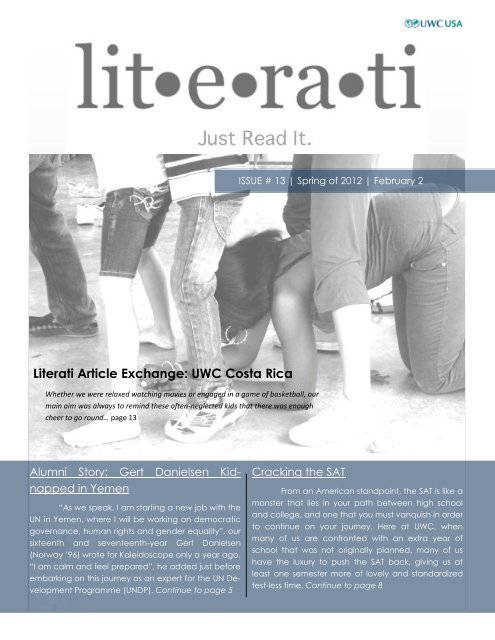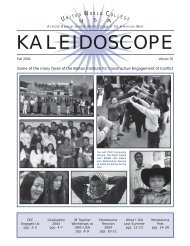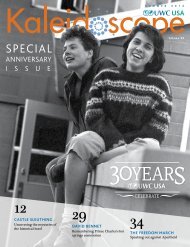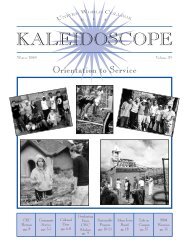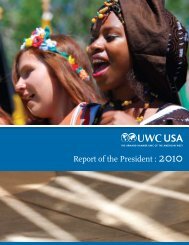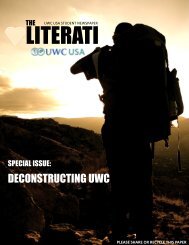Create successful ePaper yourself
Turn your PDF publications into a flip-book with our unique Google optimized e-Paper software.
Literati Article Exchange: <strong>UWC</strong> Costa Rica<br />
Whether we were relaxed watching movies or engaged in a game of basketball, our<br />
main aim was always to remind these often-neglected kids that there was enough<br />
cheer to go round… page 13<br />
Alumni Story: Gert Danielsen Kid-<br />
napped in Yemen<br />
“As we speak, I am starting a new job with the<br />
UN in Yemen, where I will be working on democratic<br />
governance, human rights and gender equality”, our<br />
sixteenth and seventeenth-year Gert Danielsen<br />
(Norway ’96) wrote for Kaleidoscope only a year ago.<br />
“I am calm and feel prepared”, he added just before<br />
embarking on this journey as an expert for the UN De-<br />
velopment Programme (UNDP). Continue to page 5<br />
ISSUE # 13 | Spring of 2012 | February 2<br />
Cracking the SAT<br />
From an American standpoint, the SAT is like a<br />
monster that lies in your path between high school<br />
and college, and one that you must vanquish in order<br />
to continue on your journey. <strong>Here</strong> at <strong>UWC</strong>, when<br />
many of us are confronted with an extra year of<br />
school that was not originally planned, many of us<br />
have the luxury to push the SAT back, giving us at<br />
least one semester more of lovely and standardized<br />
test-less time. Continue to page 8
Message from the Editors<br />
Editors:<br />
Staff:<br />
Sometimes, we tend to focus on a single thing that we<br />
are mostly comfortable with or having fun with working. With<br />
many events and opportunities happening at the same time,<br />
we should always keep a certain amount of balance in our<br />
schedule sheets. We, as students being exposed to this kind of<br />
environment, know how difficult it is to juggle through different<br />
interests that come along our way, and at some point we lose<br />
track of one. Don’t panic and calm down to get your bearings<br />
right, stand up again and learn from that mistake. It is not too<br />
late to make changes, as long as you don’t repeat it again. In<br />
this issue, it will be a collection of diverse topics and interest<br />
that you may find as a reflection of what is our lifestyle at the<br />
moment, full of stories, interests and focus that we all need to<br />
Issue #13 Spring 2012<br />
Staff<br />
Francesca Annicchiarico<br />
Jomar Pecson<br />
Nico Grubert<br />
Julius Hamilton, Inga Lam, Lara Norgaard, Laura<br />
Baika, Himmi Cheruvu, Nicolas Montano, Simona<br />
Boyadzhiyska, Patrick Drown, Tjizembua Tjikuzu,<br />
Abraham Amador<br />
Layout: Jomar Pecson<br />
Photography: Nico Grubert, Contributors, Staff<br />
Advisor: Parris Bushong<br />
<strong>UWC</strong>-<strong>USA</strong> 2011-2012<br />
Cover Photo Credit: Uchenna Anizoba (<strong>UWC</strong>CR- Nigeria<br />
’12) & Zoe Meers (<strong>UWC</strong>CR- Australia ’13)<br />
Table of Contents<br />
Global Issues Section<br />
February 2, 2012<br />
read and tackle. From SAT’s to Himmi’s Saga and even to Costa<br />
Rica, the <strong>UWC</strong> life continues and lives on but just remember to<br />
keep a balance of everything, even though, at some point, it is<br />
hard.<br />
Just Read It.<br />
Yours,<br />
Editors in Chief,<br />
Francesca, Jomar and Nico<br />
+What is Happening around the World?<br />
+Nigeria on Edge<br />
+Alumni Story: Gert Danielsen Kidnapped in<br />
Yemen<br />
Campus Section<br />
+The Himmi Saga Continues: Himmi Saves Prestige<br />
(wait, what?)<br />
+Suspicious Figures Sighted Around Campus<br />
+Cracking the SAT<br />
+Third Year Visit<br />
+Notable Alumni<br />
Features<br />
+A Box and the End of “Normal World”<br />
+Not Enough Sunshine Even <strong>Here</strong> in Tropics…<br />
+Hitchhiking<br />
2
What is Happening Around the World?<br />
By Simona Boyadzhiyska—Bulgaria<br />
� After the protests in the last two weeks, Romanians are talking about early elections<br />
Issue #13 Spring 2012<br />
February 2, 2012<br />
� A Greek priest was arrested after digging a two-meter-deep hole around the altar in a local church in search<br />
for treasure<br />
� The British police arrested four current and former members of the staff of Sun, one of the most popular<br />
newspapers in the country, for paying police officers to obtain information<br />
� The EU is about to spend 50 million EUR on a European history museum in Brussels; the House of European<br />
History will be located in a 1930s building and will open in 2014<br />
� The Dutch Muslim Party announced their intentions to participate in the next parliamentary elections; some<br />
of the aims of the party include limitation of free speech, making Turkey a EU member, no tolerance for<br />
drugs, and equal rights for men and women<br />
� Around 300 people were arrested in the state of California after the Occupy Oakland protests<br />
Nigeria on Edge<br />
By Tjizembua Tjikuzu—Namibia<br />
Nigerian President Goodluck Jonathan has suddenly<br />
shifted his attitude toward the Islamist extremist group Boko<br />
Haram, as violence spreads across northern Nigeria.<br />
A week ago, Jonathan warned the group had infiltrated<br />
the government and security forces and vowed (again) to stamp<br />
it out. But in an interview with Reuters news agency Thursday<br />
he said that if Boko Haram identified itself and stated clear demands<br />
the government was ready for dialogue. He also acknowledged<br />
that military action alone would not stop Boko Haram;<br />
and northern Nigeria needed economic development.<br />
But Nigeria-watchers think this apparent carrot may<br />
have come too late. Boko Haram's purported leader, Abu Bakar<br />
Shekau, responded in an audio message: "We're killing police<br />
officers, we're killing soldiers and other government people who<br />
are fighting Allah; and Christians who are killing Muslims and<br />
talking badly about our Islamic religion."<br />
Source: vesti.bg<br />
Over the last month, Boko Haram has carried out multiple<br />
bombings and shootings across the north; hundreds of people<br />
have been killed. Its targets are frequently police and government<br />
officials, but most of the casualties are civilians. On one<br />
day last week, at least 180 people were killed in Nigeria's second<br />
city, Kano<br />
Who are the Boko Haram?<br />
One Nigeria analyst describes the Kano attacks as a<br />
"breathtaking show of force" by Boko Haram -- one that fits a<br />
pattern of bolder and better coordinated attacks over the past<br />
year.<br />
Joe Bavier, a writer who is a frequent visitor to the region,<br />
told CNN that the "federal government has completely lost<br />
control of the north-east, despite deploying thousands of troops<br />
and establishing a Joint Task Force." Now, he says, "it looks like<br />
this insurgency has broken out of the north-east." And what's<br />
3
not to alienate people there further."<br />
Issue #13 Spring 2012<br />
February 2, 2012<br />
worrying, he says, is that there's "not a whole lot of visible effort<br />
from the federal government to calm things down."<br />
Nigerian iReporters on uncertain present, and future<br />
Philippe de Pontet, Africa analyst at the Eurasia<br />
Group, says that Boko Haram's main aim appears to be humiliating<br />
to Jonathan's government, tapping into an existing sense<br />
of grievance among Muslims in the north. He and other analysts<br />
say the government's heavy-handed response has played<br />
into Boko Haram's hands. "The impulse is to hit back hard and<br />
there are political pressures for a crackdown," de Pontet argues,<br />
"but Jonathan is so weak in the north that he needs to be careful<br />
Long the poorer part of Nigeria, the north lacks infrastructure such as reliable power. Since the end of military rule much of<br />
the region has felt excluded from the system of patronage that fuels Nigerian politics. When he acceded to the presidency in April<br />
last year, Jonathan broke the unofficial rotation of Christian and Muslim as head of state. (Source: CNN)<br />
Sudoku<br />
http://www.sudokucollection.com/sp/M052x.html<br />
4
Alumni Story: GERT DANIELSEN<br />
KIDNAPPED IN YEMEN<br />
By Francesca Annicchiarico—Italy<br />
(Continuation) Back then, little did Gert know about the price<br />
that he was to pay for pursuing his passion for international relations.<br />
Last Sunday, January the 15th, the 34-year-old <strong>UWC</strong>-<br />
<strong>USA</strong> alumnus was kidnapped in the streets of the Yemenite<br />
capital just south of the presidential palace. According to CNN,<br />
tribal sources revealed that six<br />
men who belong to the tribe<br />
Obeyid Marib forced Gert into a<br />
vehicle and drove him off to<br />
Mareb, about 170 km north of<br />
Sana’a. Apparently, the kidnappers<br />
are demanding the release of<br />
Ali Nasser Hareekdan, tribesman<br />
arrested by the state police and<br />
charged with killing Yemenite<br />
soldiers. “The tribe has made<br />
assurances regarding the safety of<br />
the staff member who reportedly<br />
remains in good health”, deputy<br />
UN spokesman Eduardo del Buey<br />
said shortly after his kidnapping.<br />
A Norwegian broadcasting company also reported that the man<br />
was allowed to speak to his family by phone while the United<br />
Nations and the Norwegian Embassy in Saudi Arabia were negotiating<br />
his release.<br />
After eleven days in the hands of the Yemenite tribesmen, Gert<br />
Danielsen was eventually freed last Thursday, January the 26th,<br />
and he is currently in Norway for a short break before resuming<br />
his duties in Middle-East. “I’m happy to be free again, and I<br />
wish to thank all those who have worked hard for my release”,<br />
he commented. According to the Norwegian foreign ministry,<br />
<strong>UWC</strong> alumnus was treated relatively well by his kidnappers.<br />
When he first arrived in Montezuma, Gert was convinced he<br />
would have become a doctor, but his experience at <strong>UWC</strong>-<strong>USA</strong><br />
unfolded new unprecedented perspectives. “If you have been in<br />
a room of red and orange for a lifetime, how do you know that<br />
your passion really is blue, green, or yellow – colors you’ve<br />
never seen or you’ve been told do not exist?” he wrote recalling<br />
the two years spent in New Mexico, when his interest in interna-<br />
Issue #13 Spring 2012<br />
February 2, 2012<br />
tional relations became stronger and stronger. During his second<br />
-year, Norwegian alumnus ambitiously asked his then English<br />
teacher Anne Farrell to write him a reference for a job with the<br />
UN. Ten years later, his teenage dream became true: in 2006,<br />
Gert worked with the United Nations in South Africa, while now<br />
he is a UN aid worker in Yemen.<br />
Hearing about the nightmare Gert<br />
Danielsen went through last<br />
week, it is perhaps hard to imagine<br />
him dancing Merengue for<br />
CLAD – as he himself recalled in<br />
the latest Kaleidoscope – participating<br />
in Aleyda’s Spanish<br />
classes, or hanging out with his<br />
Latin friends, experiences that<br />
probably contributed to his later<br />
work with Latin American’s nonprofits.<br />
It is hard to imagine him,<br />
as Anne Farrell recalled, as “the<br />
first student who refused to dissect<br />
animals in Biology class”.<br />
Risk-taking is not mentioned in<br />
our mission statement, yet it is what “peace and a sustainable<br />
future” are based upon. Now that effective talks successfully<br />
brought this member of the <strong>UWC</strong> community back to his job,<br />
Gert Danielsen’s story should make us think about where we<br />
will let United World College to take us in life and what we will<br />
bring with us along that path. As Anne wisely pointed out,<br />
“Gert’s experience reminds me that <strong>UWC</strong> is never the end of<br />
your achievement”.<br />
SOURCES:<br />
http://edition.cnn.com/2012/01/15/world/meast/yemen-unrest/index.html<br />
http://www.upi.com/Top_News/World-News/2012/01/16/UN-aid-workerkidnapped-in-Yemen/UPI-63591326742777/ <br />
http://www.yourmiddleeast.com/news/un-in-contact-with-kidnapped-norwegianin-yemen_4152<br />
http://www.uwc-usa.org/ftpimages/423/misc/misc_93315.pdf<br />
http://www.gertdanielsen.org/whois_eng.asp<br />
h t tp :/ / w w w. r eu t e r s . c o m / a r t i c le/ 2 0 1 2 /0 1 / 2 7 / u s - yem en - k i d n ap -<br />
idUSTRE80Q1M320120127<br />
5
The Himmi Saga Continues: Himmi<br />
Saves Prestige (wait, what?)<br />
By Lara Norgaard—<strong>USA</strong><br />
I have heard and seen a fair amount of unbelievable<br />
things about my dear friend Himmi Cheruvu. I have heard that<br />
she said the language spoken in Thailand begins with a “P,” I<br />
have witnessed her asking if Canada could count for America in<br />
order to be eligible for US summer programs.<br />
And all of you have seen the random<br />
(yet hilarious) nature of her newspaper<br />
articles – indeed, Himmi is far from<br />
predictable.<br />
However, if there is one thing I<br />
did not expect to hear this week, or ever<br />
for that matter, it is that Himmi Cheruvu<br />
saved Prestige Shongwe. While snowboarding.<br />
Why do I find this so unbelievable,<br />
you might ask? Well, it all began<br />
with the first snowboarding weekend this<br />
season, with an experience that made me<br />
believe that if anyone needed saving<br />
while snowboarding, it would most definitely<br />
be Himmi rather than Prestige.<br />
Before this season, Himmi had<br />
been snowboarding all of four days, and<br />
considered herself to be at an intermediate,<br />
or even intermediate-advanced skill level. For all of you<br />
who have never been snowboarding before, let me clue you in:<br />
four days on a snowboard does not result in competence on intermediate<br />
or advanced runs, it merely allows the snowboarder<br />
to fall every five minutes instead of every 30 seconds<br />
(Disclaimer: if you are considering a winter sport and don’t<br />
want to spend the vast majority of your time sitting in a pile of<br />
snow, try skiing. And yes, I am a skier. Did you notice?).<br />
Despite this fact, Himmi claimed to be an intermediateadvanced<br />
snowboarder. On the lift up to the first run, Himmi<br />
seemed nervous, so her countrymate Sam asked her what was<br />
wrong. Himmi’s answer was: “I don’t do so well on lifts…”<br />
Slightly concerned, Sam got off the lift at the top, expecting<br />
Himmi to shakily follow and possibly fall. But no, reality was<br />
much more entertaining than any of our expectations.<br />
Issue #13 Spring 2012<br />
February 2, 2012<br />
When presented with a conflict or a challenging situation,<br />
it is human nature to have a fight-or-flight response. What<br />
seemed to happen in this case was a very interesting phenomenon:<br />
combination of the two responses. Psychologists, take out<br />
your notebooks because I have no idea<br />
how to explain this one. Instead of taking<br />
the “fight” route (in other words, getting<br />
off of the chairlift and fighting the slippery<br />
snow) or the “flight” response<br />
(staying on the chairlift until the operator<br />
stopped it), Himmi stayed on the chairlift<br />
for a while and then decided it would be a<br />
good idea to get off. The result: a faceplant<br />
off of a chairlift. I have seldom seen<br />
people laugh so hard.<br />
So, do you, dear readers, understand<br />
why Himmi saving Prestige seems<br />
so absurd? Absurd it may be, but it happened.<br />
Prestige fell while snowboarding<br />
( b u t<br />
h e y ,<br />
w h a t<br />
d o<br />
y o u<br />
expect, it’s snowboarding), and after tumbling<br />
down the mountain a bit, rolled to a stop. Himmi heroically<br />
came up to Prestige to check if he was okay. In what<br />
seemed to be appropriate first-aid protocol, she asked Prestige to<br />
turn his head away from the mountain where it was pressed into<br />
the snow. But, instead of asking him if he could breathe, she<br />
just looked at the view and said, “isn’t it beautiful?”<br />
...with an experience that made me believe that if anyone<br />
needed saving while snowboarding, it would most<br />
definitely be Himmi rather than Prestige....<br />
And that, <strong>UWC</strong>-<strong>USA</strong>, is how Himmi saved Prestige.<br />
We love you Himmi.<br />
Photo Credit: Ana Dougherty<br />
6
Suspicious Figures Sighted<br />
Around Campus<br />
By Julius Hamilton—<strong>USA</strong><br />
Mysterious things have been going on this week. Last<br />
Thursday, a well-dressed gentlemen was spotted on campus,<br />
loitering in corners of rooms, sitting alone in the dining hall,<br />
suspiciously going about with a small paper envelope.<br />
According to speculation, this is a Turkish criminal<br />
overlord and hitman contractor who goes by the name of Mr.<br />
Yildirir. He is rumored to be one of the single most powerful<br />
individuals in the North American underground crime world. He<br />
runs extensive networks of petty criminals, assassins, politicians,<br />
and other individuals of power. He uses his connections and his<br />
power as invisible hands to adjust and manipulate the world as<br />
he sees fit.<br />
It has become apparent that, beginning Thursday, Mr.<br />
Yildirir has been gathering the top hitmen from around the<br />
world for an important job. His motives remain unclear, but<br />
there have been several<br />
sightings of violence<br />
around campus. Many<br />
well-known faces have<br />
simply vanished. There<br />
have been screams of<br />
shock late in the night.<br />
Many go about with a<br />
suspicious walk and<br />
eyes that dart about<br />
rooms.<br />
One source<br />
has speculated that Mr.<br />
Yildirir is using these<br />
assassins in a cruel<br />
game that for many of<br />
them will be their last<br />
job. The assassins are<br />
each given a target and<br />
told nothing more than<br />
to eliminate this target. But it may be that Mr. Yildirir is in fact<br />
assigning the assassins each other as targets, in a modern gladiator<br />
battle of sorts. Already 50 of 60 assassins have been taken<br />
out by one another. What will become of the last survivor, nobody<br />
knows.<br />
Issue #13 Spring 2012<br />
February 2, 2012<br />
The assassins reportedly use methods of firearms, explosives,<br />
injections, acid, poison, and target-activated traps. On<br />
Friday I found that someone had climbed the wall outside my<br />
room, removed the screen, and tied a rope to my bed. They are<br />
extremely cunning and difficult to detect. One must be vigilant<br />
at all times.<br />
The outcome will unfold this coming week, and perhaps<br />
some light will be shed on the secretive outbursts of violence.<br />
Lock your door at night and never be unaccompanied.<br />
These assassins are known to only strike if they can accomplish<br />
their mission in top secrecy. As ordinary civilians we have no<br />
chance against their lifelong training and natural skills in this art<br />
form. We can only pray that soon they will achieve their goal or<br />
wipe each other out. Until then, be safe.<br />
...But it may be that Mr. Yildirir is in fact assigning the<br />
assassins each other as targets, in a modern gladiator<br />
battle of sorts....<br />
Photo Credit: http://www.designboom.com<br />
7
Cracking the SAT<br />
By Nicolas Montano —<strong>USA</strong><br />
(Continuation) However, for some first years, that<br />
lovely, carefree time is coming to a close, and we must come out<br />
to face the realities of the next couple of years. I mean, take a<br />
look at the M-Codes Scheduled for this month. Frankly, they are<br />
depressing. College Planning, EE info…no thank you. At the<br />
same time, we are starting our two semester-long TOK course,<br />
and it is inevitable to experience Friday morning break without<br />
jokes from second years about it. So, when I went to take the<br />
SAT this Saturday, I was struck by how represen-<br />
tative it was of what was happening in our<br />
school.<br />
Second years were taking the exam for<br />
the last time, hoping to boost up their score just<br />
in time for the final college apps. Meanwhile,<br />
first years were trying to get an early start on the<br />
same process. Emily Swartz (<strong>USA</strong>-Colorado ‘13) said, “I took it<br />
this early to avoid taking it during 3rd semester (after watching<br />
our second years) and so that I have time to take it again as<br />
needed without it being as stressful.” That idea seemed to be a<br />
unifying theme amongst firsties, as seeing our second years go<br />
through third semester traumatized many of us.<br />
However, I could not help but see that the grand majority<br />
of first years taking the test were from the U.S. which led me<br />
to my second conclusion, which was that for foreign students,<br />
this test must be terrifying. For Americans, we virtually knew<br />
about this test since kindergarten, it is something that we knew<br />
we would all have to someday face, and we had a good 12 years<br />
to come to terms with that. But for many, who heard about this<br />
only until coming the <strong>UWC</strong>, the news must not be so pleasant.<br />
Chinyere Brown (Trinidad ’13) said of the experience, “It’s<br />
really different than our system, because there are certain rules<br />
and preparation techniques I never knew about before.” This<br />
confusion, mixed with having to grapple with vocabulary that<br />
would make an English A tremble, makes for a displeasing time.<br />
So, while the transition is going on between first and<br />
second years, U.S. students are mainly making it for the first<br />
round of exams. However, soon enough, most students will have<br />
to deal with the atrocities associated with the College Board,<br />
hopefully successfully.<br />
Issue #13 Spring 2012<br />
February 2, 2012<br />
...Second years were taking the exam for the last time, hoping to<br />
boost up their score just in time for the final college apps. Meanwhile,<br />
first years were trying to get an early start on the same<br />
process...<br />
Photo Credit: http://www.tjjournal.com<br />
8
Issue #13 Spring 2012<br />
Third-Year Visit<br />
By Simona Boyadzhiyska—Bulgaria<br />
We have already had several third years visit our campus,<br />
and even more of them are coming in the next several<br />
weeks to revert to their <strong>UWC</strong> days for a weekend. These visits,<br />
however, are seen from three different perspectives by the first<br />
years, the second years, and of course the actual visitors.<br />
The most recent visit was last weekend by Artur Fass<br />
(Estonia ‘11), one of the former editors of the Literati. As he<br />
said in a conversation, to him the campus was both very familiar<br />
and very different at the same time. Physical aspects of <strong>UWC</strong><br />
the were same – the dorms, the classrooms, the food, but the<br />
feeling of being here was different. After being used to knowing<br />
everyone in this school, now, there were a lot of new faces and<br />
the atmosphere was different. As he mentioned, the feeling of<br />
coming back as a visitor was very strange compared to being<br />
here as a student. During your two years here, you always have<br />
something to do and somewhere to be, whereas visiting the<br />
school as a graduate, you can still go to classes, but you have no<br />
obligations, you can simply hang out with your friends or meet<br />
new people. It is like going back to your old life, he says, but not<br />
fully, and he also adds, “In order to fully appreciate <strong>UWC</strong>, you<br />
need to leave it.”<br />
For the second years at school these visits are<br />
good opportunities to see and spend time with old<br />
friends, but as many say, when you stop to think about it,<br />
it feels strange. Every year, the atmosphere around the<br />
school is different from what it used to be in the previous<br />
year, and each of us is used to seeing certain people in a<br />
particular kind of atmosphere. Last year, we were the first<br />
years and our second years were part of this experience. Now<br />
that we are the second years in the school, it feels like we have a<br />
very different role in this community and the presence of the<br />
third years feels as if the past is coming back. As Kripa Dongol<br />
(Nepal ‘12) said, “It was particularly strange when Aminata<br />
[Senegal ‘11] visited, and there was a first year, a second year,<br />
and a third year living in the same room for a while.”<br />
From the first-year perspective, some say it is strange<br />
but also very exciting. On the one hand, you see people you<br />
have never seen but all your second years know – it is like going<br />
back to the time before you were born. On the other hand, as<br />
Faten Almukhtar (Bahrain ‘13) states, “It is great to meet the<br />
February 2, 2012<br />
people my second years have talked about and connect the<br />
names to the actual people.”<br />
In conclusion, as Artur says, third years visiting campus<br />
is like using a time machine, and although it is exciting, it<br />
also creates a strange feeling for many. Despite this, both first<br />
and second years are looking forward to meeting another group<br />
of third years coming to campus in the near future.<br />
...In order to fully appreciate <strong>UWC</strong>, you need to leave it...<br />
9
Issue #13 Spring 2012<br />
Notable Alumni<br />
By Nico Grubert —Germany<br />
Do you ever go on Wikipedia and look at the Notable<br />
Alumni list of schools and universities? I sure do. Quite often<br />
actually, as there are many intriguing things to find out. First of<br />
all when looking at the list of alumni of other schools, the list of<br />
<strong>UWC</strong>-<strong>USA</strong> appears very slim. However, we have to consider<br />
that our school is only about 30 years around and many of those<br />
who graduated have a career yet to develop. Therefore, it is actually<br />
incredible.<br />
So, what is there to find out about <strong>UWC</strong>-<strong>USA</strong>? Well,<br />
there was this prince once, right?! His name is Pavlos, Crown<br />
Prince of Greece. And there are sure some teachers left who<br />
remember him. Further, we all remember Sebastien de Halleux,<br />
co-founder of Playfish who clearly fulfills important success<br />
factors in terms of girls: rich and french-speaking. Not to forget<br />
Lousewies van der Laan who is a dutch politican or the American<br />
Journalist Philippe Wamba who died in Kenya while conducting<br />
research. There are even others that might be known<br />
among our students. Just as the band<br />
“Miracles of Modern Science” having an<br />
alumnus from our school or simply Matthews<br />
Theau Mmopi who has recently been featured<br />
on our website as a rhodes scholar.<br />
However, who is going to be on that<br />
list in only a few years? Eventually it could<br />
be one of us. For me, there are promptly a<br />
few names popping up in my head. Who<br />
could not imagine Phia Senett becoming a<br />
US-Senator or Hannah Freedman as an environmental<br />
activist? Still, we cannot be sure<br />
of that. What if Kripa Dongol would become<br />
a famous Bollywood actress? The possibilities<br />
are endless. Subsequently, we can never<br />
be sure of what we will become, but it if always<br />
fun to think about it. Therefore, let's go<br />
on. When looking at the list of notable<br />
alumni of the whole <strong>UWC</strong> movement, one can find the 2009<br />
whistling champion, Luke Janssen. Who would have ever<br />
thought of that? Or Zenani and Zindzi Mandela who were actually<br />
taught by our one and only Alan Wicks. Others include even<br />
many athletes and actresses (mainly Bollywood actresses), but<br />
of course also CEOs, politicians, journalists, etc. The list is quite<br />
February 2, 2012<br />
long and wait until we are going to be in the places feasible to be<br />
on that list. Who will it be? Watch out!<br />
After all this, a last question is of utter importance:<br />
does it matter to be on that list? Do we only become something<br />
if we are able to provide the school a short little notice somewhere<br />
saying proudly XX has attended our school. Well, I think<br />
this is a question everyone has to answer for themselves. Sorry<br />
for the little twist in the end.<br />
...However, who is going to be on that list in only a<br />
few years? Eventually it could be one of us...<br />
Photo Credit: http://www.telegraph.co.uk<br />
10
A Box and the End of<br />
“Normal World”<br />
By Abraham Amador—Mexico<br />
The relationship between a box and the end of the “normal”<br />
world:<br />
By the end of the twentieth century everybody thought<br />
that everything was normal, even really tiny stuff and the curious<br />
people (physicists) wanted to take a look into the normality<br />
of the small stuff. Everything was fine and going really smooth<br />
even some of them started to simplify this normality only to<br />
know that they started to study about ovens (disorder, radiation<br />
and other crazy and funny stuff). That was the start of the end of<br />
the old science.<br />
This problem related to ovens was called the dark body<br />
model. If we simplify the oven, we can take its simplest shape: a<br />
body where the light comes in but stays inside. In other words a<br />
closed place with a hole in it - a box: if you watch inside you<br />
can be sure that there is light coming in but you cannot see anything.<br />
However, Planck made it simpler than that and stated that<br />
the box was only a interactions light-body (the body is the box).<br />
After taking some hard physics math (Stefan-<br />
Boltzmann and Rayleigh-Jeans), they realized that with these<br />
assumptions, the result of a quantity called spectrum density<br />
(how are the waves distributed) was correct. However, this was<br />
only true in small frequencies (radio waves, normal light for<br />
example). When ultra violet (really strong) light was coming in,<br />
the spectrum density was going to infinite. It broke all logic<br />
rules, the logic by itself was broken; Ehrenfest called it the ultraviolet<br />
catastrophe.<br />
However, Super-Max (Planck for close friends) just<br />
figured out that the interactions could be taken only with some<br />
specific quantities: ratios of a single number. When this idea<br />
was applied to math, everything made sense- The interactions<br />
(oscillations and spectrum) were only possible in ratios of a<br />
number originally called with the great name of: Elemental<br />
quantum of action. Despite being so great, the name was long;<br />
hence, it was abbreviated as Planck’s constant (it never changed<br />
since then) or with a simple h.<br />
However, Super-Planck started to have problems because<br />
his solution was not able to solve nothing else than the<br />
interactions between the dark body and the light. However, Super-Einstein<br />
figured out after some years what happened, and<br />
Issue #13 Spring 2012<br />
February 2, 2012<br />
accidentally created the basis of his worst nightmare: Quantum<br />
Physics. Einstein discovered that the equations didn’t work out<br />
with everything because the elemental Quantum of Action was<br />
not only for interactions, every single thing in the universe can’t<br />
be smaller than h. Everything in the universe is built by billions<br />
of h bricks hence everything can be quantized.<br />
Why is the quantum physics Einstein’s worst nightmare?<br />
He simply perfected the science, which is the principal<br />
enemy of the Relativity; this theory works just for massive<br />
things with massive quantities of energy…quantum physics deal<br />
with so small stuff that they can even measure everything in<br />
quantities in quantum and mini bricks of h.<br />
What’s the spectrum density?<br />
I don’t want to put hard math in this article but I would<br />
like to explain the equations involved first of all the density of<br />
radiation depends on the frequency and temperature, which directly<br />
gives us energy with classic, and quantum physics with<br />
different equations. There are several articles or books about the<br />
dark body model also Planck wrote about it on his Scientific<br />
Biography where he explains how he figured out the great: Elemental<br />
Quantum of Action.<br />
11
By Inga Lam—Hong Kong<br />
Issue #13 Spring 2012<br />
Flip…Side<br />
The Mayans say the world’s going to end in 2012; I say<br />
the zombie apocalypse comes before that. If you’ve been walking<br />
around campus lately, you might’ve noticed the numerous<br />
pale-faced, sunken-eyed IB students - or should I say - living<br />
undead, ambling up and down dreary-looking cement paths as<br />
they drag their tired limbs out of their neglected beds (two hours<br />
of sleep is nowhere near enough, the mattresses have spoken)<br />
and make their way towards white-walled classrooms with<br />
drooping heads and bloodshot eyes.<br />
Have you ever heard of these things - or as Jakob<br />
Sprenger likes to say - “thingys”, called IAs? Some call it internal<br />
Assessments; others call it Infernal Atrocities. The assignment<br />
in itself, its origin and purpose, is beautiful, we’re sure; but<br />
the timing of the deadlines? Not so much. It’s like finally being<br />
able to break out of the surface of the water for one big gulp of<br />
air, then having another ginormous wave pulling you down - and<br />
then there’s you desperately trying not to drown.<br />
Imagine that feeling of having just finished your two<br />
Chemistry IAs, experiencing that fantastic moment of<br />
having heavenly joy erupting from within, causing<br />
you to leap out of your chair, throw your arms in the<br />
air and cry “I’m DON-“ - only to have this wondrously<br />
victorious yet ephemeral episode interrupted<br />
by the sighting of big, glaring, red words stating “MATH IA<br />
DUE ON SAME DATE. ECON IA DUE TOMORROW” on the<br />
faded, tattered, yellow post-it note stuck to the shelf of your<br />
desk and BAM! You’re on your chair again, palms over your<br />
face as you lament, “Y U NO SHOW MERCY TO ME, INFER-<br />
NAL ATROCITIES!” (Note: If you caught the 9gag reference<br />
there, that means you probably spend too much time procrastinating,<br />
and the above situation has probably applied to you before.)<br />
Then again, going back to this zombification phenomenon<br />
mentioned in earlier paragraphs, while it applies to many,<br />
this symptom can be seen most evidently in a particular species<br />
known by the alias – MAADers, a group that has been known to<br />
give 120% in everything they do. And by everything, they mean<br />
everything.<br />
Naturally, that’s impossible.<br />
February 2, 2012<br />
Even the seemingly unbeatable Kung Fu Panda could<br />
only do two things perfectly at one time (eat and fight, or rather,<br />
show off, that is) - and just look at those huge, blackish-purple<br />
panda eyes etched on his face. Indeed, these MAAD mortals are<br />
an ambitious bunch. From practicing in the most ridiculous of<br />
places, to rehearsing until early hours in the morning, to immersing<br />
into their own culture to a point where they’ve forgotten<br />
how to speak properly in English - they’ve done it all; it’s a<br />
dedication that would make Tom Lamberth proud.<br />
I have nothing more to say.<br />
<strong>Here</strong>’s to achieving inner peace, my friends.<br />
Until then.<br />
...Y U NO SHOW MERCY TO ME, INFERNAL<br />
ATROCITIES!....<br />
12
Not Enough Sunshine Even<br />
<strong>Here</strong> in Tropics…<br />
By Uchenna Anizoba (<strong>UWC</strong>CR- Nigeria ’12) & Zoe Meers (<strong>UWC</strong>CR- Australia ’13)<br />
Through a variety of projects ranging from more relaxing<br />
tasks such as nurturing sea turtles on neglected beaches to<br />
more intense ones like helping post-conflict societies in El Salvador<br />
with their recovery process, each year every student at<br />
<strong>UWC</strong>-CR gets an opportunity to create if only, a little more sunshine<br />
for others in the community.<br />
A wide range of amazing opportunities exists to travel<br />
throughout Central America with the aim of exposing every student<br />
to one issue or another and in groups, finding ways to address<br />
them. It is something that is looked forward to by students<br />
since September and a week that you never forget. <strong>Here</strong> in<br />
Costa Rica while our project week options are very limited due<br />
to financial constraints, there is no doubt about the real impact<br />
on the different communities which these projects have. Each<br />
year with the profundity of the emotional ties formed among<br />
team members as well as with the service communities they are<br />
engaged with, several projects are recycled to allow for familiarity<br />
and to see the development of seeds previously planted.<br />
Our project week this year comes up in late February<br />
and some of the options available to <strong>UWC</strong>CR students include<br />
last year’s Shark and Turtle Conservation in Costa Rica, volunteering<br />
in the International Children's Rainforest in Monteverde,<br />
Costa Rica, assisting war-torn societies El Salvador and restoring<br />
innocence to abused children at Medal Hogar de niñas Medalla<br />
Milagrosa, Panama. There has since been the introduction of<br />
new service opportunities such as living with and helping the<br />
indigenous Bri Bri community of Bambu rainforest in Costa<br />
Rica.<br />
Sadly, one of the Project Weeks that did not make it to<br />
this list this year was one that held some of the best moments for<br />
the few second years chosen for the week last year. Our memorable<br />
‘Proyecto de Semana’ experience last year in S.O.S Village,<br />
Panama City could, despite all our rigorous efforts, not be<br />
relived a second year coming (you can secretly be thankful we<br />
simply won’t be able to recycle this article again next year!).<br />
However, hopefully you will enjoy reading this short recount<br />
and also gain some insight on what Service Week 2011 was like<br />
in Aldeas S.O.S, Panama City.<br />
When you first hear of Panama City, you can easily<br />
picture it; with all its tall buildings and fascinating tourist sites,<br />
Issue #13 Spring 2012<br />
February 2, 2012<br />
such that but for the conspicuous display of nature one could<br />
easily mistake it for Vegas at night. A ten-minute drive up north<br />
from all this glamour, lies the S.O.S village where we spent the<br />
week... Truly a world of its own, waiting to share its immense<br />
beauty with the rest of the world. The daylong bus ride that began<br />
our six-day journey to begin our volunteer work was soon<br />
forgotten in the smiles and excitement that we saw from those<br />
kids when they saw that we were there just to be with them.<br />
It was the longest yet shortest five and a half days of<br />
my life. Long because our treasured memories from Panama<br />
could easily last a lifetime and short because for all of us, the<br />
week simply ended too soon.<br />
Most of our mornings were spent teaching the kids<br />
some beginner-level English and for the rest part of the day we<br />
engaged them in several mental and physical activities, which<br />
were mostly targeted at creating environmental awareness and<br />
promoting peace. Whether we were relaxed watching movies or<br />
engaged in a game of basketball, our main aim was always to<br />
remind these often-neglected kids that there was enough cheer to<br />
go round. With only ten people having to entertain fifty kids<br />
between the ages 4-8, as one would expect most of our days<br />
were extremely strenuous, but at the end of the day, we were all<br />
happy knowing that the time well spent.<br />
During our stay in the village, though we were there<br />
mostly for the kids, we did whatever work needed to be done,<br />
ranging from painting road signs to cooking meals We accomplished<br />
many great things, but the greatest victory of all was<br />
seeing the difference we had made in the lives of the kids and in<br />
the entire village.<br />
This year, as much as I wish to relive the enjoyable<br />
experience I had at S.O.S Panama last year, I am very excited to<br />
venture into something new. In a few weeks, Zoe and I will be<br />
teaming up with about fifteen others to work in the Bambu rainforest<br />
for about five days. In the <strong>UWC</strong> spirit of multiculturalism,<br />
we hope to pick up some of the Bri Bri culture while living with<br />
this indigenous community and come back to share it with the<br />
rest of the <strong>UWC</strong>CR family. As challenging as the project<br />
sounds, we sure hope it will be a rewarding experience for all!<br />
13
By Laura Baika —Latvia<br />
Issue #13 Spring 2012<br />
Hitchhiking<br />
Hitchhiking is one of the cheapest ways of traveling.<br />
By tradition, hitchhiking is defined as soliciting a ride by standing<br />
at the edge of a road, facing traffic, with one's thumb extended/upwards.<br />
When hitchhiking, you can meet a lot of people<br />
and make lots of friends. However, you can also become very<br />
frustrated, or encounter danger on the way. Today's drivers are<br />
more fearful of picking up hitchhikers than in the past. I love<br />
this hobby and practiced it for years and have reached (almost)<br />
every destination with it. It<br />
doesn't matter if I just want to<br />
go into the next city to party or<br />
want to hitch all over a foreign<br />
country. It fascinates me to get<br />
in contact with very different<br />
kind of people I otherwise<br />
wouldn't be able to meet or people<br />
I would be concerned to<br />
meet. Hitchhiking helps me to<br />
believe in the good of humans<br />
when I begin to doubt. This is<br />
easy for me when a stranger<br />
drives 200 km, just not to drop<br />
me of in the middle of the night.<br />
First, what do you have to be ready for? Be prepared to walk all<br />
day. It is not easy and you need to think that it is more of a<br />
walking adventure with a chance of getting a ride more than<br />
anything else. This is the most unanticipated problem of many<br />
hitchhikers today. Buy a map of the area, so you can determine<br />
whether a ride will actually bring you closer to your destination.<br />
Make sure to carry enough food and drinks if you're going for a<br />
long trip. Definitely, arrange sleeping places. For example a<br />
Hospitality exchange host such as couchsurfing.org, a youth<br />
hostel, or a squat are good places to start with. If you cannot<br />
arrange a place, take a tent with you, rubberized German poncho,<br />
and/or a warm sleeping bag. Remember, hitchhiking may<br />
be illegal in some areas or on certain types of roads. In the end,<br />
don’t forget to bring a black marker, a hat, a flashlight, a pocketknife,<br />
sunscreen, etc... it is best to be prepared and these items<br />
do not weigh much.<br />
Second, the most important factor for getting a ride is the location.<br />
You need to find a place where you can be seen early, and<br />
February 2, 2012<br />
where the driver can safely pull over. Check your map, or ask<br />
around, to find a good spot. For long-distance traveling, never<br />
get taken into the center of town! Get dropped off close to the<br />
highway. The absolute best place to catch a good ride is on a<br />
public highway on ramps, near a truck stop, but not on the truck<br />
stop property itself, as those are good places to get thrown out of<br />
for trespassing. Moreover, gas stations where many cars stop are<br />
good. Further, avoid places where cars cannot stop legally, like<br />
no-stopping zones, taxi<br />
stands, etc. The only people<br />
likely to give you a ride<br />
from these places are the<br />
police, and you may not<br />
want to go where they want<br />
to take you. Getting a ride<br />
at night is very difficult.<br />
You might have some luck<br />
at a gas station, where people<br />
can see you, but realistically<br />
you are probably better<br />
off camping out for the<br />
night and starting off again<br />
at first light.<br />
Third, asking around doesn't hurt. If people notice you're<br />
friendly or even speak their language you have a much higher<br />
chance of getting a ride from them. Walk in the direction you<br />
want to go, especially if nobody is stopping to pick you up. Nod<br />
or wave thanks to all who at least give you eye contact and especially<br />
those who give you gestures explaining why they cannot<br />
take you. Wear bright clothing so that drivers can see you. A big<br />
cardboard sign with an indication of where you want to go can<br />
help. Short general directions like North, or West can be written<br />
bigger - and seen from further away - than a longer city or town,<br />
but a city is more useful for drivers. Avoid writing destinations<br />
far away, this gives you a good excuse to get off if you feel uncomfortable<br />
with the driver, you can always agree to go further<br />
if the driver turns out to be going your way. Ask if you can be<br />
dropped off at a good spot for getting more rides if your ride<br />
isn't bringing you to your final destination, e.g. a gas station or a<br />
toll place. When possible, try to agree about where to be<br />
dropped off so you don't end up in a bad place.<br />
14
Issue #13 Spring 2012<br />
February 2, 2012<br />
Last but not least, take care who you get a ride with. Some criminals prey on hitchhikers. If in doubt, turn down the ride.<br />
If you're in doubt, ask the driver where they're going and tell them you're heading elsewhere. For safety, note the vehicle registration,<br />
and its make, model, and color before you take a ride. If you have a telephone, text this information to a friend or if possible,<br />
hitchhike with a friend. Choose a car with a single occupant or a couple rather than the last seat in a car full of people. Sit in the<br />
front passenger seat, if you can. Rear doors often have child locks on them, meaning they cannot be opened from the inside. If you<br />
must sit in the back, check the child lock is off before you close the door. Wear at least some of your valuables (i.e. passport, wallet,<br />
money, I.D., bank and credit cards, etc.) under or in your clothes, rather than in your pack. Keep them in different places, so<br />
that if you lose one item, you don't lose them all. It is a good idea to have your wallet plus two hiding places, an obvious one and a<br />
not so obvious one.<br />
Ten Commandments are:<br />
Always be friendly: a nice conversation while traveling shortens the trip and motivates the driver to stop for the next hitchhiker<br />
again.<br />
Be patient: don't knock over reflector posts! (Sorry Flo ;-)<br />
Act frankly: drivers get very furious, when they stop for one hitchhiker and two more jump out of the bush.<br />
First come, first serve: if the favorite hitch spot should be busy you can either wait until your forerunner is away or you can place<br />
yourself some meters behind him (never ever in front of him).<br />
A smile on your face increases your chances to get a lift: don't be a bore and let the sunshine in your heart! Further some flowers<br />
from the roadside in your hand can be heart-melting.<br />
Look for a well lighted place when it's dark: if the hitchhiker is early and well to see more cars will stop and the drivers fear will be<br />
decreased.<br />
Choose a spot where cars can easily stop: bus stops, parking bays, motorway services, etc. are best. Besides, spots are recommended<br />
where cars are slow.<br />
The attendance of a woman works like an accelerator: let her hitch hike and stay in the background by yourself.<br />
Ignore Provocations: even cops and fools are humans<br />
Captions<br />
What could<br />
Jarl think?<br />
Photo Credit: http://www.nztramping.com<br />
Cut the box and drop<br />
it to the designated<br />
Literati box or to a<br />
Literati staff. We are<br />
going to pick the best<br />
caption and publish it<br />
in the next issue.<br />
15


